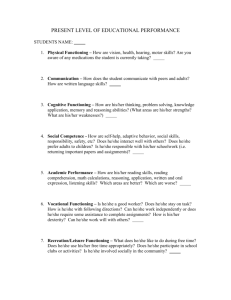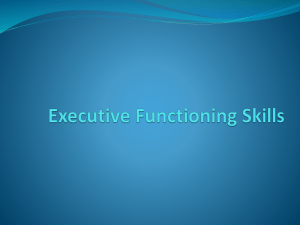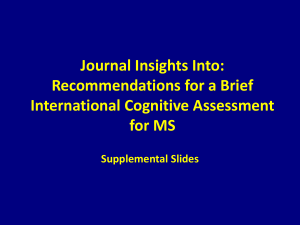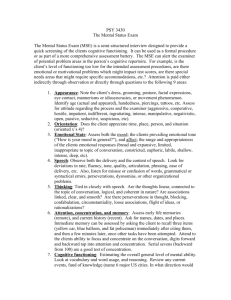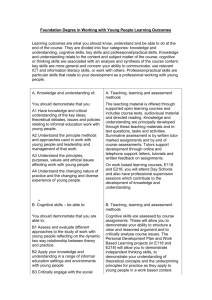Executive Functioning
advertisement
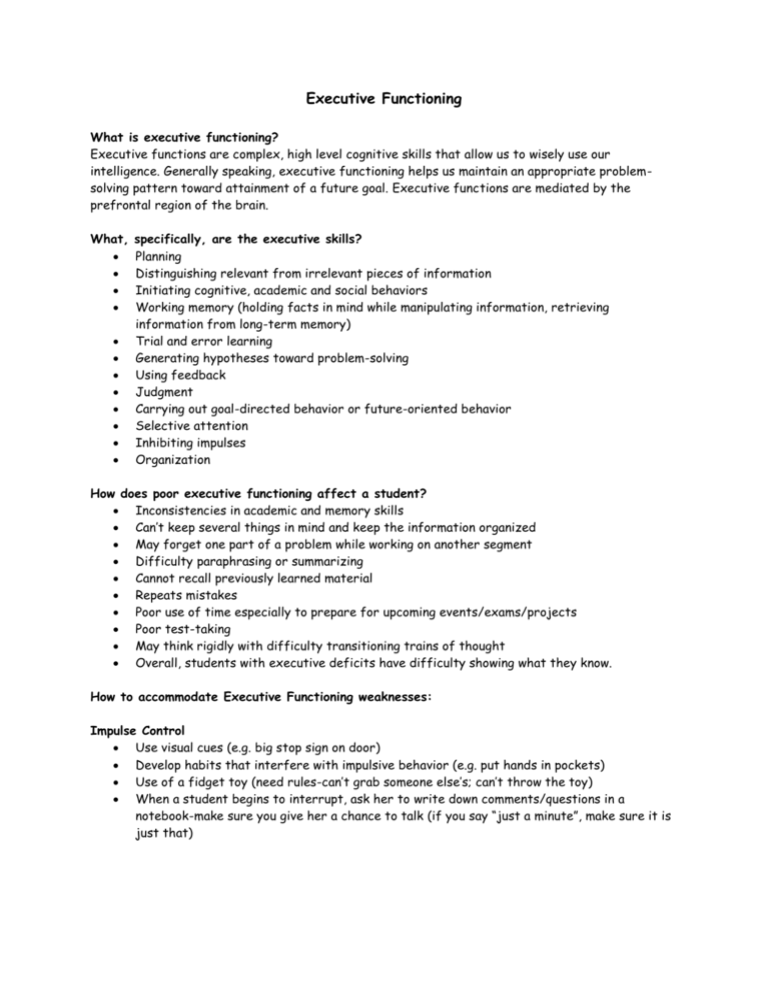
Executive Functioning What is executive functioning? Executive functions are complex, high level cognitive skills that allow us to wisely use our intelligence. Generally speaking, executive functioning helps us maintain an appropriate problemsolving pattern toward attainment of a future goal. Executive functions are mediated by the prefrontal region of the brain. What, specifically, are the executive skills? Planning Distinguishing relevant from irrelevant pieces of information Initiating cognitive, academic and social behaviors Working memory (holding facts in mind while manipulating information, retrieving information from long-term memory) Trial and error learning Generating hypotheses toward problem-solving Using feedback Judgment Carrying out goal-directed behavior or future-oriented behavior Selective attention Inhibiting impulses Organization How does poor executive functioning affect a student? Inconsistencies in academic and memory skills Can’t keep several things in mind and keep the information organized May forget one part of a problem while working on another segment Difficulty paraphrasing or summarizing Cannot recall previously learned material Repeats mistakes Poor use of time especially to prepare for upcoming events/exams/projects Poor test-taking May think rigidly with difficulty transitioning trains of thought Overall, students with executive deficits have difficulty showing what they know. How to accommodate Executive Functioning weaknesses: Impulse Control Use visual cues (e.g. big stop sign on door) Develop habits that interfere with impulsive behavior (e.g. put hands in pockets) Use of a fidget toy (need rules-can’t grab someone else’s; can’t throw the toy) When a student begins to interrupt, ask her to write down comments/questions in a notebook-make sure you give her a chance to talk (if you say “just a minute”, make sure it is just that) Initiation For younger kids, use a song to guide them through morning routines. Younger kids may need help getting started (e.g. when cleaning their room, go with them to their room and suggest what they should start with; be specific) Before starting a seated task, engage in some gross motor activity (quick walk, throw a ball) Planning / Time Management Use timers / Alarms Estimate amount of time needed for a task and then write down actual time Use calendars (build habit for checking them) Request assignments one week in advance to allow for planning homework and studying Help break down assignments, projects and tasks into reasonable parts, then set deadlines Cognitive Flexibility Review upcoming changes to schedule or environment (e.g. substitute teacher) Allow for a break / place to calm down when child encounters frustration with change Teach relaxation breathing Provide warnings/signals prior to transitions Organization Email assignments to teacher and self Keep a second set of textbooks at home Frequently check backpack, notebooks, desk, locker and assignment book Establish weekly time to organize desk, etc. Color coding of folders At home, be sure to establish an organized study space, with all needed materials, dry-erase board / calendar Working Memory Use lists as reminders (words or pictures) Use a voice recorder / voicemail messages to record tasks, assignments, reminders Note-taking services; Students should be given a copy of class notes Help students develop mnemonics or other strategies to help remember a series of steps Teach visualization strategies to enhance recall Self-Monitoring Highlight math operation signs Proofread aloud Proofread by reading backwards Double check assignments Reread the directions after completing a task and go back to see if you followed them Allow students to review assignments and correct errors which are marked
